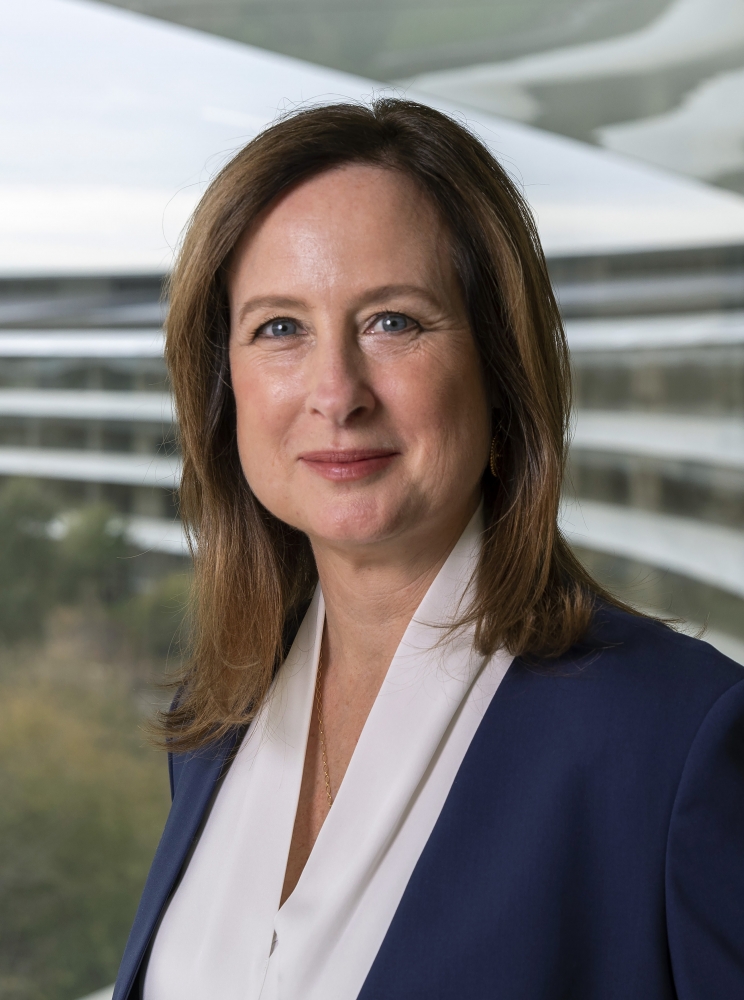Now general counsel and senior vice president of legal and global security at Apple, Adams feels on top of her game.
 "It's a dream job," she says. "At Apple, we really believe that the products and the services that we provide are enriching billions of lives on this planet, and we strive to do that in a way that leaves the world a better place."
"It's a dream job," she says. "At Apple, we really believe that the products and the services that we provide are enriching billions of lives on this planet, and we strive to do that in a way that leaves the world a better place."
Adams' drive to make the world a better place is an ambition with long and deep roots. As a child in Brooklyn, New York, she was surrounded by environmental activists. Indeed, it was there in 1970 that her parents, John H. and Patricia Adams, established the now-international environmental advocacy group, the Natural Resources Defense Council (NRDC).
"It was sort of a family affair," recalls Adams. "We spent time in the offices of the people working at NRDC and socialized with them, but also with the broader community of people who were working on environmental causes."
As a young adult, Adams recalls her undergraduate years being bookended by a rigorous and regimented high school experience at an elite boarding school, and highly structured, traditional law training at the University of Chicago.
But despite its equivalent academic rigor and prestige, her time at Brown felt entirely different.
"It was a deep counterpoint to those other experiences—the Open Curriculum, the experience of being your own guide, in many ways, to your educational development," she says.
Adams draws parallels between the Brown paradigm of exploration and risk-taking in a fertile yet forgiving environment and the real-world murkiness she has had to navigate in the decades since she marched through the Van Wickle Gates
"At Brown, you were given a high degree of freedom at quite a young age to chart your intellectual course, and to explore things that might feel scary," says Adams. "I think that has lived on throughout my career, and in being able to navigate a lot of open-endedness and grayness in terms of what choices to make."
To many alumni, the true distinctiveness of a Brown education lies in this openness, and in the consequent sharing of knowledge across fields. Adams is no exception.
"It was the perfect college for me," she says. "I got a phenomenal education and I didn't need distribution requirements to achieve that. I think I took classes in pretty much every discipline by the end of the four years."
To Adams, the founding of an environmental institute on College Hill—especially one with a major emphasis on collaboration—has felt inevitable since her undergraduate days.
"IBES has this specifically interdisciplinary focus on environment and society, which I think is a perfect fit with the Brown mission," she says. "Brown is in a position to make a unique contribution by marrying those two concepts. That's a perspective that doesn't exist strongly elsewhere."
Indeed, Adams has been an enthusiastic patron of IBES since its doors opened in 2014. She and her husband, Duke Wiser, have supported a variety of research endeavors at the Institute, from expanding ecological understanding of reforestation in Brazil's Atlantic rainforest to tracing the effect of climate change on preterm birth. She is hopeful that these and other projects will inform action on the most pressing challenges of living in a warming world.
"When you're looking at Earth-threatening problems, the hope is that IBES will make meaningful contributions to solving, ameliorating, or mitigating the damage to humans and their environment from climate change and other forms of environmental degradation—and to take a position as a voice as we tackle these problems globally," she says. "You can already see that coming through in some of the research emerging from the Institute."
To Adams, IBES's strength lies not only in its capacity for innovative and impactful research, but also in its potential to craft a clear path for undergraduates seeking an education that will adequately prepare them to navigate the complex and disparate silos of knowledge inherent to today's environmental challenges.
"IBES draws on the entire University network to be able to pull all the strands together from a lot of different departments," she explains. "In an area like this where much of the best research is going to be interdisciplinary, the student doesn't know how to pull on those strands themselves, individually. It's just too heavy a lift."
"To have this Institute that the students can take advantage of, whose mission is to make sure that the various parts of this vast organism are coordinated and pull together in a smart way," she says, "it's just a huge educational opportunity."